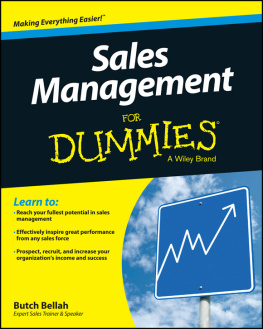Table of Contents
Introduction:
Its a Daily Battle!
The First Time Management Secret:
Get Grounded!
The Second Time Management Secret:
Think About It Before You Do It!
The Third Time Management Secret:
Think Right!
The Fourth Time Management Secret:
Prioritize Your Customers and Prospects!
The Fifth Time Management Secret:
Stay on Top of the Flow!
The Sixth Time Management Secret:
Clean out the Gunk!
The Seventh Time Management Secret:
Create Systems!
The Eighth Time Management Secret:
Stick to an Effective Sales Process!
The Ninth Time Management Secret:
Nurture Helpful Relationships!
The Tenth Time Management Secret:
Stay Balanced!
10 Secrets of
Time Management
for Salespeople
GAIN THE COMPETITIVE EDGE AND
MAKE EVERY SECOND COUNT
By
Dave Kahle

Copyright 2003 by Dave Kahle
All rights reserved under the Pan-American and International Copyright Conventions. This book may not be reproduced, in whole or in part, in any form or by any means electronic or mechanical, including photocopying, recording, or by any information storage and retrieval system now known or hereafter invented, without written permission from the publisher, The Career Press.
10 SECRETS OF TIME MANAGEMENT FOR SALESPEOPLE
EDITED BY NICOLE DEFELICE
TYPESET BY EILEEN DOW MUNSON
Cover design by Johnson Design
Printed in the U.S.A. by Book-mart Press
To order this title, please call toll-free 1-800-CAREER-1 (NJ and Canada: 201-848-0310) to order using VISA or MasterCard, or for further information on books from Career Press.

The Career Press, Inc., 3 Tice Road, PO Box 687,
Franklin Lakes, NJ 07417
www.careerpress.com
Library of Congress Cataloging-in-Publication Data
Kahle, Dave J.
10 secrets of time management for salespeople : gain the competitive edge and make every second count / by Dave Kahle.
p. cm.
Includes index.
ISBN 1-56414-630-8 (pbk.)
eISBN : 9781601639042
1. Selling. 2. Time management. I. Title: Ten secrets of time management for salespeople. II. Title.
HF5438.8.T54 K34 2003 658.85dc21
2002073350
Introduction:
Its a Daily Battle!
Remember the television commercial of the salesperson driving down the expressway with a cell phone balanced on his shoulder, a cup of coffee in one hand, and a laptop computer teetering on the dashboard? The voice in the background says, You know hes out there.
Thats a frightening commercial because of the element of truth in it. The life of a salesperson these days is a battle with an overwhelming number of things to do, ever rising expectations, and conflicting pressures.
While this has always been the case for field salespeople, in recent years the pressures have increased dramatically on every aspect of the salespersons job. Customers are more sophisticated, more demanding, and harder to see. Voice mail has compounded the difficulty of the salespersons job, making it necessary to be constantly on the phone. Whereas a few years ago a salesperson could visit a customer without an appointment, getting that appointment today adds multiple phone calls to the salespersons job. Each phone call is one more task and one more small investment of time in an already full day.
The products and services offered by many salespeople have expanded in quantity and sophistication. As companies strive to meet the fracturing demands of their customers, the number of items sold has increased proportionately. I just finished a phone call with a sales manager who described a typical situation. His company, previously a software publisher with one basic product, had recently purchased a competitor. The combined sales force now has 11 products to sell. Every time a new product or service is introduced, it must be learned, the information must be filed, the presentation organized, etc. All of these things take time out of the salespersons day. A salesperson with 10 things to sell must spend much more time dealing with information and organization than one with half as many offerings.
So, not only are customers demands and the increasing number of products and services adding more pressure to the salesperson, but also the companies for whom they work are chipping in with additional demands. Salespeople are being asked to collect more information about their customers, report in more sophisticated ways, use more complex computer programs, and take part in more meetings than ever before.
The concept of the field salesperson as part of a team is growing more common. All that communication with team members adds more tasks to the salespersons already long list. Each new task is an additional investment of time.
No wonder typical field salespeople feel like the weight of the world is pressing down on them. Their jobs have become overwhelming. Field salespeople are working more hours and as a result, feeling more stressed. Personal relationships fracture as spouses, children, and significant others are neglected. Production suffers as salespeople are confronted with too much to do and not enough time in which to do it.
At the same time, traditional time management guidelines have little application for the field salesperson. A few years ago, I watched a time management guru present a two-day seminar at an annual sales meeting for the company for which I worked. This university professor conveyed principle after principle of time managementall very appropriate if you worked in an office all day long, but very inappropriate if you were a field salesperson. The audience of field salespeople became more and more frustrated as the seminar progressed. Finally, one of my colleagues stood up and said, You dont understand. We dont get interruptions, we are the interrupters!
Clearly, most of the time management principles and tactics presented by this and other gurus totally miss the unique challenges of the field salesperson.
All of this may be moot if it doesnt impact you. So, before you read any further, reflect on whether you personally feel the weight of any of these pressures. Complete the assessment below:
1. Has the quantity of the products or services you sell increased in the last few years?
2. Have those products or services become more complex and sophisticated?
3. Are your customers more difficult to see today than they were three years ago?
4. Does voice mail give you fits?
5. Do your customers expect you to set appointments rather than just stop in?
6. Are customers more pressed for time when you see them?
7. Does your company require you to collect more information today than it did a few years ago?
8. Are you expected to complete more forms and attend more meetings, either in person or electronically, than previously?
9. Are you expected to work more closely with others in your organization, perhaps even be part of a team?
10. Do you find yourself working longer and harder than you did a few years ago?
11. Are your personal relationships suffering as a result of your stress and hours on the job?
12. Are you worrying about your personal performance?
A yes answer to any one of these is reason enough to focus on improving your time management skills. If you answered yes more than three times, you are ripe to crash and burn. Drop everything and read the rest of this book now!
Benefits of smart time management
Imagine that you have waved a magic wand and transformed yourself into a time management expert. You are now totally in control of your days, working at the most effective things, delegating wisely, and calmly producing excellent results. What would that mean to you?
Next page








